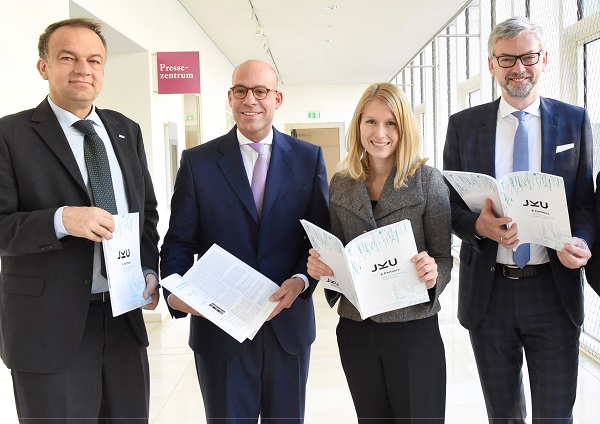Upper Austria’s contribution to medical technology is both valuable and sustainable. The new JKU Whitebook provides a remarkable overview of local expertise.

Dr. Michael Strugl, Deputy Governor and State Minister for Economic Affairs, reiterated, “Progress in medicine relies on advancements in technology. Linking fields of application in medicine and health together with technical solutions give development, manufacturing, and using medical technology products a greater dimension resulting in high growth potential for and in Upper Austria.”
“Innovative Upper Austria 2020”, a coordinated regional strategic economics and research program, has five areas of activity designed to lay a defined course and steadily tackle future issues in Upper Austria. Individualized medicine is anchored in the area of “Health / Ageing Society” and the state of Upper Austria pointedly supports the development of personal technologies, particularly those designed to aid an aging society as well as increase employability so individuals can be active in the workplace for longer. The goal is also to allow elderly individuals to live in their own homes longer and be an active part of society. Medical technology is emerging as a promising field with enormous future potential. The Whitebook for Medical Technology showcases the many projects that local businesses and research facilities are currently working on.
A tried and true recipe for success to drive innovation in Upper Austria includes cluster cooperation projects, such as “GeT” by Greiner Bio-One and the Upper Austrian Health and Hospital AG (gespag). Deputy Gov. Strugl added, “As part of the various cluster initiative projects, we support collaboration between companies as well as companies that have R&D and/or qualification and health facilities. Business Upper Austria has a medical technology cluster and since 2002, it has successfully been a linchpin in bringing business, science and medicine together.” The medical technology cluster has already implemented 86 ideas in the med-tech industry as part of cluster collaboration projects as well as national and international projects.
Creating the University of Applied Sciences for Health Professions in Upper Austria and the Faculty of Medicine at the Johannes Kepler University has been groundbreaking for continuing development in Upper Austria as well as enhancing the region’s international visibility as an area of business and research. As part of “MED UP – Medical Upper Austria”, the medical innovation landscape is being driven by an even stronger network of business, science, and medicine. At the same time, the opportunities brought about by digitalization in medicine are being recognized and used by businesses and research in Upper Austria.
Enormous Potential for Business and Research
Mag. Christine Haberlander, State Minister for Education, Women’s Affairs and Health, explained, “Upper Austria has an excellent research environment and as the newly established Kepler University Hospital focuses on medical technology, clinical ageing, and health services research, it is predestined to conduct medical research. All parties in Upper Austria – meaning healthcare institutions, R&D institutions, educational institutions, and businesses – must pull together to drive innovation in healthcare as well as support high-quality patient care and safety.”
A carefully structured program including patient care, teaching and research will enable quick access to new therapies and medical innovation.
The University of Applied Sciences for Health Professions in Upper Austria shows just how successfully research can be conducted with partners in the healthcare industry. There is a strong focus on research projects in the areas of health, wellbeing, and prevention as well as assisted technologies designed to improve human health and the overall quality of life. The projects’ goals include creating a scientific basis as well as developing and evaluating professional and cross-professional practices and teaching. Interdisciplinary research across professional groups is essential in order to solve complex challenges to the health system.
As part of the surge of requests to cooperate in the R&D area, the specific perspective and expertise of non-medical health professions at the crossroads of health and technology is in high demand. The ongoing involvement of end-users and project stakeholders as well as their scientific support with special consideration of ethical aspects lies within the area of expertise at the University of Applied Sciences for Health Professions in Upper Austria.








